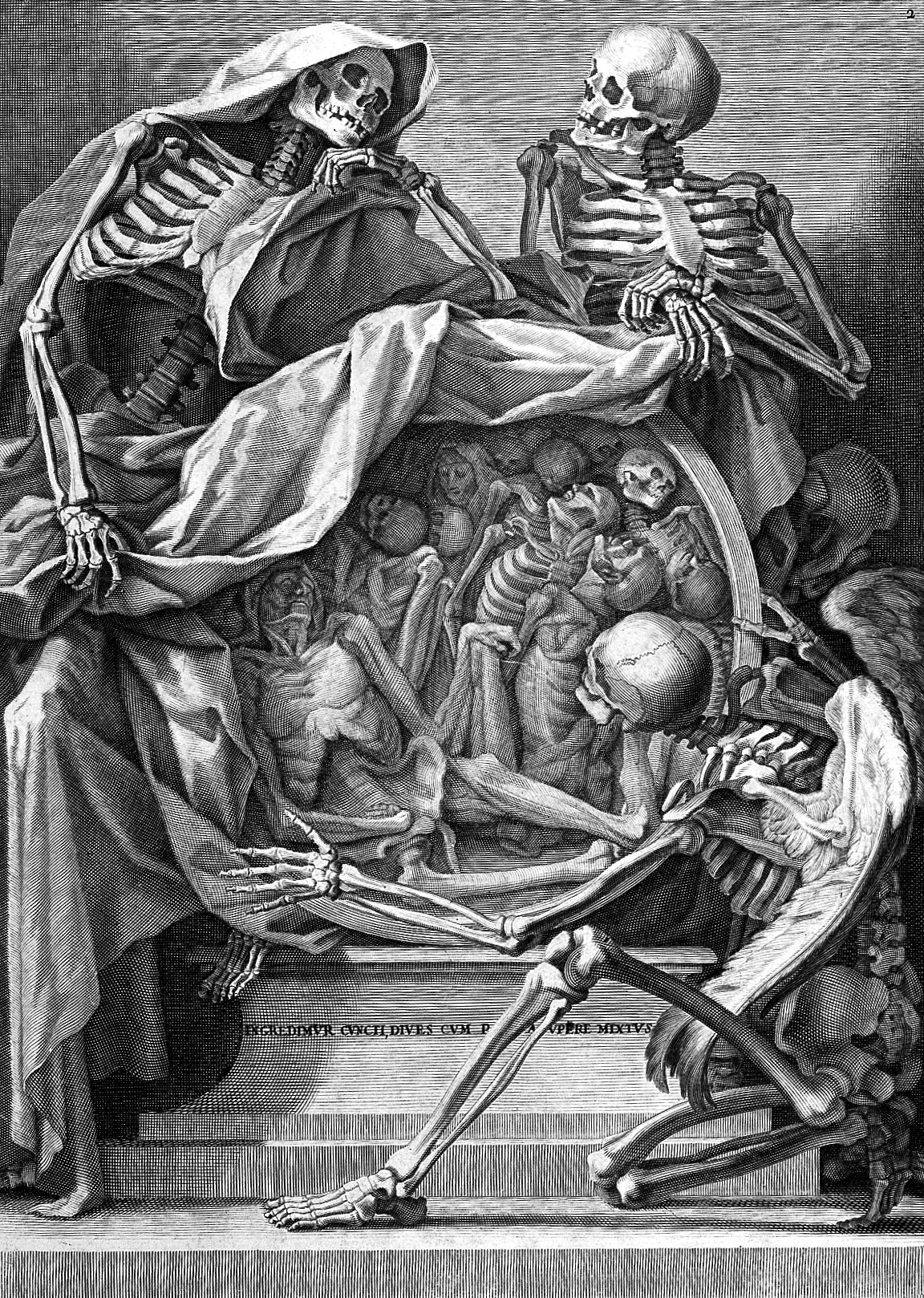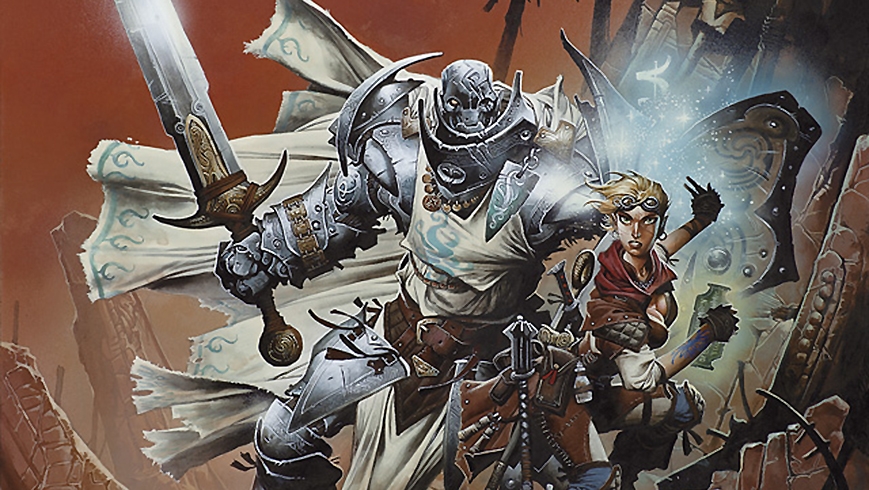I proposed a question a while back. Are immortal PC’s a problem or are they workable? The consensus appears to be that they are workable. I decided to take a pass at setting up a framework for using it in D&D. Death is ultimately just a small challenge after all. Immortality offers a range of cool stories that make the PC’s feel special in the world, which is sort of the point.
So, to get this out of the way, I am not talking about the immortality of souls. That is foundational to a lot of religions and is a basic belief in a lot of D&D settings. That is not what we are talking about here. This is a physical immortality. Note that I am not talking about invulnerability. This does not mean adventurers can’t be hurt, it is just that they will always recover from even fatal injuries or spells. Whatever explanation you go with, the result is that the PC’s just always gets back up, eventually.
Speaking of explanations, let’s try to come up with some. Here are a few, but this is not a comprehensive list.
Chosen of the Gods
The gods have vast power and mortality is only a small thing to such beings. The chosen of the gods are often given powers to serve the gods will. Indeed, raising the dead is already dipping into the realms of the gods, so immortality is not so strange a notion. The reason your PC’s were chosen is a story all its own. Is there prophecy? Are the PC’s the sort of people that god may get along with or are they being punished? Maybe they are destined to replace the gods?
Arcane or Alchemical Experimentation
Some wizardly types like to experiment with forces that may be best left alone. Gunpower, for instance, may have been discovered by an alchemist searching for immortality. There are plenty of examples of this going badly. The history of China is dotted with emperors who thought they would be the one true immortal monarch only to be killed by the “treatments.” In a magical world, however, such things are possible. The PC’s, in this scenario, are subject to such a cure for dying. The story behind that has all kinds of possibilities. Was it an accident? Is the alchemist trying to reproduce immortality again? Was it on purpose? Why were the PC’s chosen to be immortal?
The Way of the Universe
The universe just has an interesting quirk that produces immortals. A confluence of forces makes people who live forever. The PC’s are not the first, and they likely will not be last. This is certainly the version found in Highlander. They never really explain the origin of immortals in Highlander or the following TV series. I know this because there has never been any other Highlander films besides the first! Fight me!…. Joking aside, this way does have some solid story options. If the PC’s are not the first immortals then what have the previous ones been up to? Did they join a greater secret conflict, or are there immortal god kings out there? Do the immortals know of each other?
Rules for Immortality
So, how do you handle immortality in a rules context? Well, first you have to establish limits on the immortality. An immortal is still able to be harmed. There are no differences in how damage is delivered, or what effects them. Poisons still works on them. Diseases run their course. The only real change is that effects that would cause death(failing death saves, poisons, death spells) simply cause them to go dormant for 15 minutes. They can be healed out of that dormancy, but that is not without consequence.
There is precedence for returning from the dead in D&D. The Raise Dead spell bestows a -4 penalty on all attack rolls, saving throws, and ability checks until the PC get a long rest. I would keep to something like that. A friend made the suggestion of using exhaustion mechanics instead for immortals and I tend to agree. After their period of dormancy, the immortal is awake, but at exhaustion level 4. That means they are at disadvantage to all ability checks, saving throws, and attack rolls. They are also move at half speed and are limited to half their hit points. They recover with a long rest, but only one level of exhaustion per long rest. Dying is not trivial for them, just temporary.
How do you kill those who can’t die? Effects with disintegrate or that dissolve the body completely will do the trick. Simply burning the body doesn’t work unless it is reduced to ash. A fireball is not hot enough, but inside a kiln or furnace is. Destroying a body is harder than it sounds. As long as there is some of their body left, they will recover. Certain effects may take longer to recover from, at the GM’s discretion. Examples may include complete dismemberment, the body being reduced to a pulp, or the like.
To reflect that the PC is an immortal, they simply need to take the Feat.
Immortality
You are immortal and cannot die.
-
You are considered immortal for all effects that require immortality.
-
Effects that would kill you will render you dormant for 15 minutes.
-
Recovering from death effects causes an exhaustion level 4 effect on you.
-
Special rules may apply.
This Feat is available to any race and have no other requirements. The cost of using a Feat may seem to be expensive as it give no other bonuses, but you are effectively getting a free Raise Dead spell with no component cost so that offsets the extra bonus to another stat.
Alternatively, a DM may just decide the PC’s in his game are just immortal. There is no reason you can’t do that and that may work better for some campaigns. Another option could be that it is only available as an effect from a particular potion, or an item, or any number of options. I think the rules guidelines here is pick whichever works for your campaign.
Challenges for Immortals
One thing you might ask is how do you challenge an immortal? The fear of death is a significant motivator and removing that fear could make it harder to scare the PC’s. The fear they feel at losing their character can be a thing that instills caution or can give a story some stakes. This is sort of true, but here are a few points to think about.
First, 5th edition D&D makes death less of a problem than many previous editions. In some previous editions, the process could involve permanent loss of stat points or worse. You have Revivify at third level, which is a quick and relatively painless version. The only real cost appears to be a monetary one for components and they are not that expensive. The point is that death is already a little easier to deal with in this particular edition.
Second, death is not the only threat out there. Sure, the PC’s may be immortal, but are their friends? That village they are there to protect isn’t filled with immortals. The king is probably not immortal. That priest of their church, is also not immortal. Even if your PC’s are sociopathic murder hobo’s, being immortal and trapped in a dungeon forever is not great for them. Sure, they are immortal, but that 100 ton block of marble fell on them. They get to be immortals stuck in that trap forever. Imagine being stuck in a water trap forever, constantly drowning over, and over, and over till the end of the world. If you think about, not dying gives a whole new range of horrors the PC’s can face.



